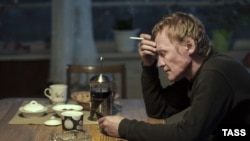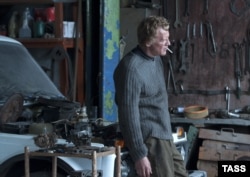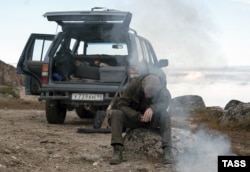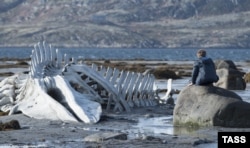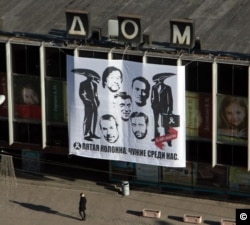On Monday, February 25, 2019, Russian state media outlet RIA Novosti took aim at popular actor Aleksey Serebryakov over comments critical of Moscow’s foreign policy.
During a forum in London, Serebryakov said that Moscow had “incited conflicts” in Georgia, Chechnya, Syria, Africa and Ukraine, while also accusing the government of "rewriting history."
The RIA report specifically took issue with the inclusion of Africa, noting the artist had not “clarified” what the Russian incitement would be “guilty” in Africa.
Serebryakov could well have been referring to reports that Russian private military contractors with state support are operating in the Central African Republic and beyond.
“This is not the first time Serebryakov has delivered anti-Russian statements,” RIA reported, noting a February 20, 2018 interview in which the actor said Russia’s national identity was defined by "power, arrogance and rudeness."
“No matter how you look at it, today neither knowledge, enterprise, intelligence nor dignity are part of our national idea. Our national idea is power, arrogance and rudeness,” Serebryakov said.
Creating a “Russian national idea” has been a key part of Putin’s presidential agenda since his coming to power nearly two decades ago. “Patriotism is the Russians’ holy duty. That is our national idea,” Putin said in his speech before the students of the Moscow State University in 2016.
The Russian Orthodox Church joined the Putin narrative, announcing that the national idea of Russia is to “be holy.”
Serebryakov’s opinion is clearly different.
But RIA’s characterization of Serebryakov’s statements as “anti-Russian” are misleading.
To disagree with and criticize the current government for historical revisionism and to state it has incited conflicts at home and abroad, correct or not, is clearly an opinion regarding policy and not nationality.
Serebryakov said as much in comments to RIA Novosti, stating he is “a patriot of Russia, no less than those who shout about it.”
“Since I am a citizen of Russia, I have a civil position which is connected with the fact that war is a terrible tragedy comparable with planetary cataclysms,” he said, adding that life is priceless and he is an “active pacifist against war.”
Even his previous comments can be interpreted as much as his Hobbesian view on life in the Russian provinces (a prominent feature of one critically-acclaimed film in which he starred, Leviathan) as anti-Russian sentiment.
Serebryakov, who immigrated to Canada with his family in 2012, faced a harsh backlash at that time, with Leviathan producer Alexander Rodnyansky claiming the public outrage only served to prove the actor’s point.
"Unfortunately, here in Russia we are familiar with such attacks,” Rodnyansky told The Hollywood Reporter.
"Serebryakov's opinion can be irritating to someone and people have the right to disagree with him, but the harassment that ensued, calls to strip him of his Russian passport and ban him from ever working again — this just proves his point, that the Russian society is ill," he said.
Writing for Vedomosti, Pavel Artekar said “maybe the actor’s words were a little clumsy,” noting that ‘”power, arrogance and rudeness’ cannot be said to define the national identity.”
“The description better fits the behavior of Russia’s bureaucrats — at home and abroad — in recent years,” Artekar said.
Leviathan itself was similarly lambasted at home for being anti-Russian, with Orthodox Christian activist Kirill Frolov calling it “a filthy libel against the Russian church and the Russian state” and Culture Minister Vladimir Medinsky attacking it for alleged inauthenticity.
“However much the authors made them swear and swig liters of vodka, that doesn’t make them real Russians. I did not recognize myself, my colleagues, acquaintances or even acquaintances of acquaintances in ’Leviathan’s’ characters,” the New York Times cites Medinsky as telling the newspaper Izvestia. “Strange, but among the movie’s characters there is not a single positive one.”
Other popular artists in Russia have similarly faced accusations of anti-Russian sentiment when criticizing government policy.
Rock star Andrei Makarevich was attacked for his decision to perform in Eastern Ukraine territory under Ukrainian government control, with Yevgeny Fedorov, an MP for the ruling United Russia party, saying he should be stripped of his state awards.
In 2014, following Russia’s military incursion into Ukraine, Makarevich found himself alongside fellow rock star Yuri Shevchuk and three political figures – Ilya Ponomarev, Aleksei Navalny and Boris Nemtsov – on a banner hung from House of books reading “Fifth column. Foreigners among us.”
Of those five men, Navalny has been regularly attacked and blinded in an acid attack, Ponomarev was forced into exile and Nemtsov was murdered outside the Kremlin four years ago on February 27, 2015. All four have been detained and arrested on multiple occasions for organizing or taking part in opposition marches.
Russian actress Liya Akhedzhakova, a critic of the Kremlin’s policy, last month said that young people are now afraid to express their civic position.”
She added. "Today there is a lot of Sovietism. There’s snitching. There’s denunciations … it’s generally a tradition in Russia. To knock, to pawn people.”
She brought up the case of Alexander Sokurov, a renowned director who correctly predicted his Example of Intonation foundation would be targeted due to his criticism of Putin and the Russian government.
Meanwhile, while Russian singer Yuri Loza said Serebryakov should no longer be offered roles and producer Joseph Prigozhin said some people’s minds “are simply missing” in relation to the controversy, actor Alexei Panin said Serebryakov is understood by every reasonable person and “everything he said was correct.”
As to Serebryakov’s claims about Russian involvement in Africa, there is plenty of evidence Russia focuses on propping up fragile nations battling civil war, such as the Central Africa Republic.
“The current Kremlin is trying to export counterrevolution,” Kiril Avramov told the Voice of America Russian Service. The post-doctoral research fellow at the University of Texas at Austin’s Intelligence Studies Project said than destabilizing regimes, Russia looks for countries already besieged.
Last year, Russia proposed a logistic base in Eritrea, an East African country emerging from decades of conflict with a neighbor.




